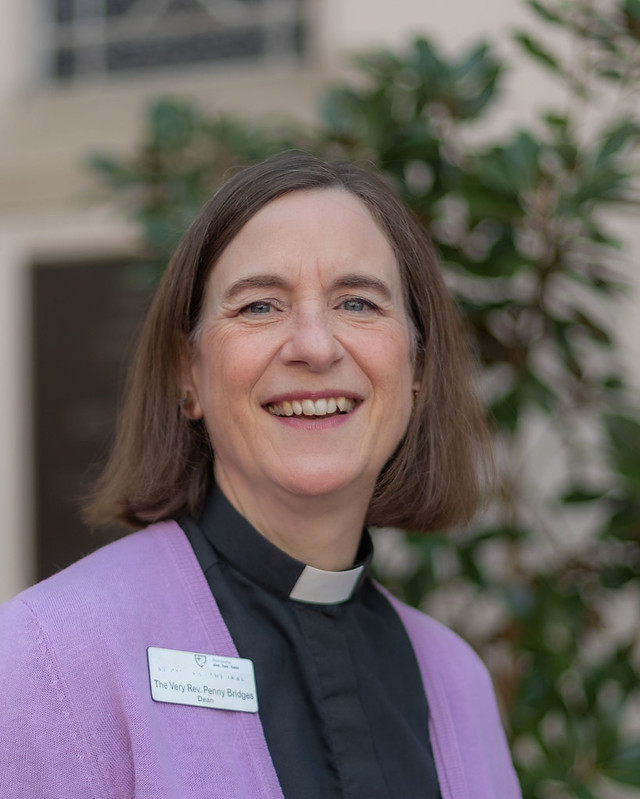
Palm Sunday 2025, Penelope Bridges
After the celebration [singing and dancing], after the procession and the palms, after Hosannas and hymns, we have zigzagged our way through Scripture, finally descending in the Gospel through kangaroo court and public humiliation to the deep darkness of death on a Cross. The crowd disperses, the noise quiets, the spectacle is over, and all that remains is a small group of broken-hearted women, keeping vigil for their lost beloved.
Take a deep breath. Allow yourself to feel the exhaustion, the emptiness, the profound silence of this moment.
This solemn day comes at us from several directions, each one with its own dizzying contrasts.
First, in this moment of liturgy: the excitement of blessing the palms in the courtyard, [the drums and whistles, the parade,] waving to the neighbors, [the car alarms going off,] the grand entrance into the church. This is Palm Sunday.
Now, on a broader canvas, and in our modern context, compare that feeling with the hype of anticipating an important election season: the rallies, the speeches, the memes, the charismatic leader, the dreams and hopes of a newer, better, more loving world.
And, moving back in time, allow yourself to enter into the moment that Luke describes: the euphoria of a new day for God’s faithful people: the healings, the feeding, the crowds that gathered, the leader sent from God, dreams and hopes for a people long oppressed and persecuted.
And then the script flips … In our liturgy, Isaiah’s suffering servant, the plaintive psalm, the account of the Passion, the heart of the gospel taking us deep into introspection as we reflect on Luke’s portrayal of the last
compassionate words of one who gave his life for us: Father forgive; today you will be in paradise; into your hands.
And …the months following that important election: regardless of how you voted, the disappointment, anger, grief, building as the weeks unfold by blow after destructive blow to the governmental culture of care built over 90 years, the replacement of welcome mats by border walls, the replacement of dignity by cruelty, the replacement of globalization by isolationism. The shock of going from excited hope to bewildered grief and a dread of what tomorrow may bring for ourselves and for those we love.
And in Jerusalem on a spring day two millennia ago, the hope and anticipation of liberation, turned to horror and deep grief, as their beloved leader, the Messiah and prophet of God’s kingdom, was accused, mocked, tortured, and killed in front of them, without even a protesting voice raised to stop it, the dream cut short.
And here we are, facing the chasm of Holy Week, where hope holds its
breath, and the mouth of the tomb yawns open.
We might ask: Why didn’t Jesus seize the moment that presented itself as he led the crowd into Jerusalem? Why didn’t he take up the sword and drive the lawless occupiers out? Why were his last words about care for his fellow sufferers, pleas for God to forgive the torturers, a prayer of commendation into God’s arms, instead of a call to arms, a defiant message for his supporters?
If you think back to the first Sunday in Lent, you’ll recall the temptations of Jesus in the desert: seize power, rule the world, destroy your enemies. And you’ll recall that Jesus steadfastly resisted. By refusing to buy in to hate and violence, Jesus remains true to his own nature and to his calling. The prince of peace will rule through love, or not at all. He will defeat evil by subverting it, not by meeting violence with violence.
You might also recall that on that first Sunday in Lent the Gospel ended by saying that the devil, frustrated in his plan, departed from Jesus until an opportune time. Now is that opportune time, as Jesus is tempted again, first by the crowds, then by the words of Pilate, and finally by the thief hanging next to him, to claim his throne, to declare his divinity, to save his own skin.
But no: this is the way of love, to give his own life for the sake of the beloved. And the beloved means all of God’s children, means you and me, as we once again confront the stark reality of the Cross, as we prepare for this week of vigil, as we walk through these days of pain, both in our faith and in the world around us. So come, let us enter into prayer for this broken world and especially for the Holy Land, let us pray for forgiveness for ourselves and for those who reject the way of love, let us move more deeply into the mystery of Christ’s sacrifice and commend our own lives to the loving care of the God whom we know in the Cross, in the sacred meal, and in the never-failing promise and hope of a new creation.

